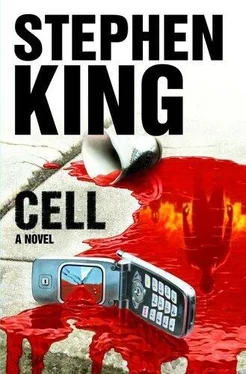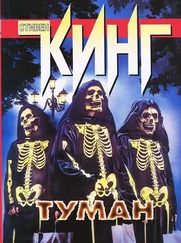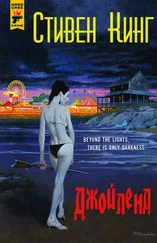"They'd smell the cooking?" Clay asked.
"Let's just say that we have no desire to find out," the Head replied. "Have we, Jordan?"
"No, sir," Jordan said, and took a bite of his second burger. He was slowing down, but Clay thought he'd manage to do his duty. "We want to be inside when they wake up, and inside when they come back from town. That's where they go, to town. They're picking it clean, like birds in a field of grain. That's what the Head says."
"They were flocking back home earlier when we were in Malden," Alice said. "Not that we knew where home for them was." She was eyeing a tray with pudding cups on it. "Can I have one of those?"
"Yes, indeed." The Head pushed the tray toward her. "And another hamburger, if you'd like. What we don't eat soon will just spoil."
Alice groaned and shook her head, but she took a pudding cup. So did Tom.
"They seem to leave at the same time each morning, but the home-flocking behavior has been starting later," Ardai said thoughtfully. "Why would that be?"
"Slimmer pickings?" Alice asked.
"Perhaps . . ." He took a final bite of his own hamburger, then covered the remains neatly with a paper napkin. "There are many flocks, you know. Maybe as many as a dozen within a fifty-mile radius. We know from people going south that there are flocks in Sandown, Fremont, and Candia. They forage about almost aimlessly in the daytime, perhaps for music as well as food, then go back to where they came from."
"You know this for sure," Tom said. He finished one pudding cup and reached for another.
Ardai shook his head. "Nothing is for sure, Mr. McCourt." His hair, a long white tangle (an English professor's hair for sure, Clay thought), rippled a bit in the mild afternoon breeze. The clouds were gone. The back porch gave them a good view of the campus, and so far it was deserted. Jordan went around the house at regular intervals to scout the hill sloping down to Academy Avenue and reported all quiet there, as well. "You've not seen any of the other roosting places?"
"Nope," Tom said.
"But we're traveling in the dark," Clay reminded him, "and now the dark is really dark."
"Yes," the Head agreed. He spoke almost dreamily. "As in le moyen вge. Translation, Jordan?"
"The middle age, sir."
"Good." He patted Jordan's shoulder.
"Even big flocks would be easy to miss," Clay said. "They wouldn't have to be hiding."
"No, they're not hiding," Headmaster Ardai agreed, steepling his fingers. "Not yet, at any rate. They flock . . . they forage . . . and their group mind may break down a bit while they forage . . . but perhaps less. Every day perhaps less."
"Manchester burned to the ground," Jordan said suddenly. "We could see the fire from here, couldn't we, sir?"
"Yes," the Head agreed. "It's been very sad and frightening."
"Is it true that people trying to cross into Massachusetts are being shot at the border?" Jordan asked. "That's what people are saying. People are saying you have to go to Vermont, only that way is safe."
"It's a crock," Clay said. "We heard the same thing about the New Hampshire border."
Jordan goggled at him for a moment, then burst out laughing. The sound was clear and beautiful in the still air. Then, in the distance, a gun went off. And closer, someone shouted in either rage or horror.
Jordan stopped laughing.
"Tell us about that weird state they were in last night," Alice said quietly. "And the music. Do all the other flocks listen to music at night?"
The Head looked at Jordan.
"Yes," the boy said. "It's all soft stuff, no rock, no country—"
"I should guess nothing classical, either," the Head put in. "Not of a challenging nature, at any rate."
"It's their lullabies," Jordan said. "That's what the Head and me think, isn't it, sir?"
"The Head and I , Jordan."
"Head and I, yes, sir."
"But it is indeed what we think," the Head agreed. "Although I suspect there may be more to it than that. Yes, quite a bit more."
Clay was flummoxed. He hardly knew how to go on. He looked at his friends and saw on their faces what he was feeling—not just puzzlement, but a dreadful reluctance to be enlightened.
Leaning forward, Headmaster Ardai said, "May I be frank? I must be frank; it is the habit of a lifetime. I want you to help us do a terrible thing here. The time to do it is short, I think, and while one such act alone may come to nothing, one never knows, does one? One never knows what sort of communication may flow between these . . . flocks. In any case, I will not stand idly by while these . . . things . . . steal away not only my school but the very daylight itself. I might have attempted it already, but I'm old and Jordan is very young. Too young. Whatever they are now, they were human not long ago. I won't let him be a part of this."
"I can do my share, sir!" Jordan said. He spoke as stoutly, Clay thought, as any Muslim teenager who ever strapped on a suicide belt stuffed with explosives.
"I salute your courage, Jordan," the Head told him, "but I think not." He looked at the boy kindly, but when he returned his gaze to the others, his eyes had hardened considerably. "You have weapons—good ones—and I have nothing but an old single-shot .22 rifle that may not even work anymore, although the barrel's open—I've looked. Even if it does work, the cartridges I have for it may not fire. But we have a gasoline pump at our little motor-pool, and gasoline might serve to end their lives."
He must have seen the horror in their faces, because he nodded. To Clay he no longer looked like kindly old Mr. Chips; he looked like a Puritan elder in an oil-painting. One who could have sentenced a man to the stocks without batting an eye. Or a woman to be burned at the stake as a witch.
He nodded at Clay in particular. Clay was sure of it. "I know what I'm saying. I know how it sounds. But it wouldn't be murder, not really; it would be extermination. And I have no power to make you do anything. But in any case . . . whether you help me burn them or not, you must pass on a message."
"To who?" Alice asked faintly.
"To everyone you meet, Miss Maxwell." He leaned over the remains of their meal, those hanging-judge eyes sharp and small and burning hot. "You must tell what's happening to them —to the ones who heard the infernal message on their devil's intercoms. You must pass this on. Everyone who has had the daylight robbed away from them must hear, and before it's too late." He passed a hand over his lower face, and Clay saw the fingers were shaking a little. It would be easy to dismiss that as a sign of the man's age, but he hadn't seen any tremors before. "We're afraid it soon will be. Aren't we, Jordan?"
"Yes, sir." Jordan certainly thought he knew something; he looked terrified.
"What? What's happening to them?" Clay asked. "It's got something to do with the music and those wired-together boomboxes, doesn't it?"
The Head sagged, suddenly looking tired. "They're not wired together," he said. "Don't you remember me telling you that both of your premises were wrong?"
"Yes, but I don't understand what you m—"
"There's one sound-system with a CD in it, about that you're certainly right. A single compilation disc, Jordan says, which is why the same songs play over and over."
"Lucky us," Tom muttered, but Clay barely heard him. He was trying to get the sense of what Ardai had just said— they're not wired together. How could that be? It couldn't.
"The sound-systems—the boomboxes, if you like—are placed all around the field," the Head went on, "and they're all on. At night you can see their little red power lamps—"
"Yes," Alice said. "I did notice some red lights, I just didn't think anything of it."
Читать дальше








